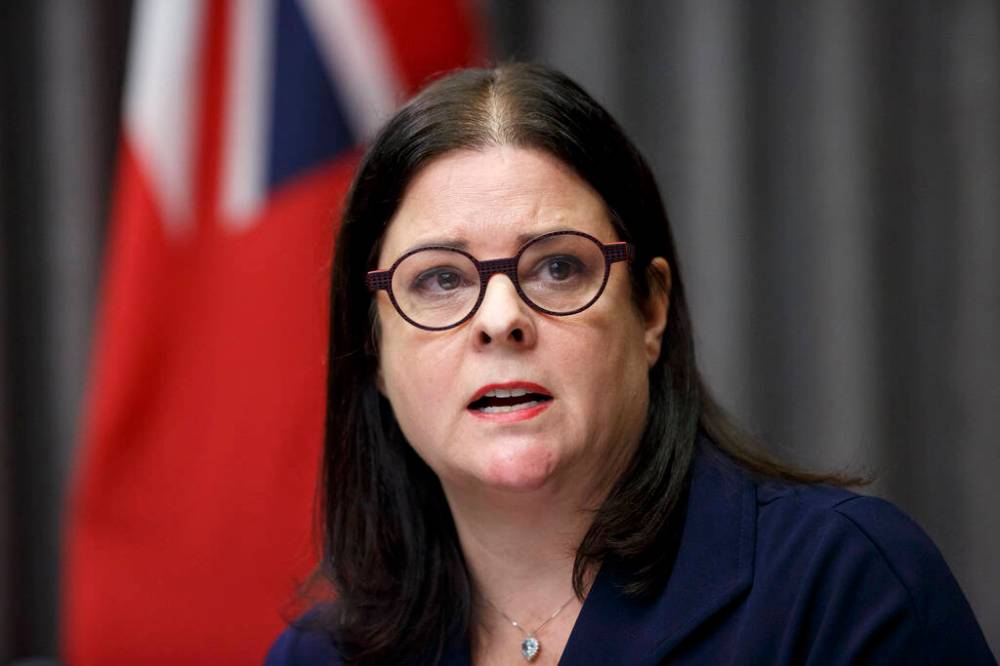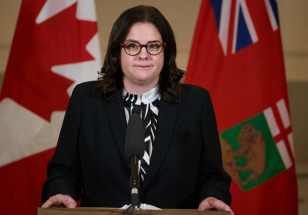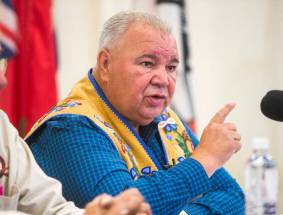Stefanson admits breaking conflict-of-interest rules Premier failed to disclose property sales worth more than $31M
Read this article for free:
or
Already have an account? Log in here »
To continue reading, please subscribe:
Monthly Digital Subscription
$19 $0 for the first 4 weeks*
- Enjoy unlimited reading on winnipegfreepress.com
- Read the E-Edition, our digital replica newspaper
- Access News Break, our award-winning app
- Play interactive puzzles
*No charge for four weeks then billed as $19 plus GST every four weeks. Offer only available to new and qualified returning subscribers. Cancel any time.
Read unlimited articles for free today:
or
Already have an account? Log in here »
Hey there, time traveller!
This article was published 26/01/2022 (1063 days ago), so information in it may no longer be current.
Premier Heather Stefanson has admitted she failed to follow the province’s conflict-of-interest rules after the sale of properties worth millions of dollars.
The real estate deals that tripped up the premier involve rental and commercial properties that are the subject of a letter the NDP sent to the province’s conflict-of-interest commissioner; however, Stefanson is unlikely to face any consequences under legislation that critics have long complained has no teeth.
In 2019, the McDonald Grain Company Ltd. — Stefanson is listed as a director — sold The Ritz apartment block (859 Grosvenor Ave.) for $7 million and Drury Manor (1833 Pembina Hwy.) for $22.5 million without filing a statement disclosing the disposal of assets.

In 2016, she failed to disclose the disposal of a storage facility on Saulteaux Crescent the McDonald Grain holding company sold for $1.78 million. Stefanson owns 20 per cent of the shares in the real estate holding company.
The Legislative Assembly and Executive Council Conflict of Interest Act requires that members file with the clerk of the legislative assembly statements within 15 days of the start of a new session that list their and their spouses’ assets and any potential conflicts. If they acquire or dispose of any assets afterward, they’re required to file a further statement disclosing them, and are to meet with the conflict-of-interest commissioner within 60 days to ensure that adequate disclosure is made.
Stefanson, who has been an MLA since 2000, had listed the properties for several years among her assets and then stopped, but failed to file any statements disclosing they had been disposed of when they were sold.
On Thursday, Stefanson said in a prepared statement that she should have done so, and that it was an “oversight” and would be corrected immediately.
Canada’s democracy watchdog says provinces across the country rely on elected officials to follow what amounts to an honour system and that it’s a “bad system.”
“Voters need to know what politicians and public officials own and owe in order to determine whether they’re in a financial conflict of interest,” Duff Conacher, co-founder of Democracy Watch, said from Toronto Wednesday.
“It simply can’t be determined unless you know what they own and what they owe. If you want to serve the public, then you shouldn’t have any problem disclosing what your private interests are. No one who actually wants to serve the public should have any problem with disclosing this information.”

Having someone in charge of a province who forgets to disclose the disposal of assets worth millions of dollars is troubling, the director of the non-partisan, non-profit organization said.
“Why should anyone trust them with the public budget of billions of dollars?” Conacher said.
Elected officials’ acquisition and disposal of assets needs to be tracked in real time, especially when it involves real estate and members of a governing majority with the power to quickly change laws and regulations, he said.
“If we don’t have that information, you simply cannot tell at any time whether a politician or public official has a conflict of interest, and that’s why the disclosure is key and why meeting the deadlines for the disclosure is also key,” he said.
Across Canada, conflict-of-interest or ethics commissioners don’t have the power to punish violations, Conacher said. Some don’t even have the power to investigate alleged breaches.
In Manitoba, members’ disclosure statements can be viewed in person in the clerk of the legislative assembly’s office. The documents aren’t available electronically and making photocopies is not permitted.
If a voter believes a member has a conflict, they must go to Court of Queen’s Bench and pay $300 to file a detailed affidavit asking a judge to authorize a hearing before another judge. If the hearing is granted and the judge determines conflict-of-interest rules were broken, the member could be suspended for up to 90 days, pay a fine of up to $5,000, get kicked out of office and have to pay restitution to the government or Crown agency for any financial gain that resulted from the violation.

The opposition NDP sent conflict-of-interest commissioner Jeffrey Schnoor a letter regarding the premier’s failure to disclose disposing of $31 million in assets. It asked him for an opinion on whether members should be required to follow the rules laid out in the legislation.
“It is of the utmost importance that public officials who are charged with creating and administering the law follow those same requirements themselves,” NDP finance critic Mark Wasyliw said in the letter obtained by the Free Press.
Elected leaders need to be transparent about their business transactions because “those transactions can impact and influence their public decision-making,” the letter from the member for Fort Garry said.
“This is a matter that concerns the ability of Manitobans to trust their leaders are following the law and the law applies to all Manitobans equally, regardless of their political position.”
The premier needs to explain how she failed to disclose selling off the assets, he said Wednesday.
Conflict laws in Canada called wimpy
Canada’s conflict-of- interest laws are too trusting and inadequate thanks to a lack of oversight or deterrence and a reliance on public officials being transparent and forthcoming.
“It’s a really bad system,” said Democracy Watch director Duff Conacher.
Provincial governments appoint ethics or conflict-of-interest commissioners, who don’t have the power to punish violations, he said. In some provinces, they don’t even have the authority to investigate alleged breaches, he said.
Rather than a “watchdog,” some will appoint “a lap dog,” said Conacher, whose group is a non-partisan, non-profit organization that advocates for government accountability.
Canada’s conflict-of- interest laws are too trusting and inadequate thanks to a lack of oversight or deterrence and a reliance on public officials being transparent and forthcoming.
“It’s a really bad system,” said Democracy Watch director Duff Conacher.
Provincial governments appoint ethics or conflict-of-interest commissioners, who don’t have the power to punish violations, he said. In some provinces, they don’t even have the authority to investigate alleged breaches, he said.
Rather than a “watchdog,” some will appoint “a lap dog,” said Conacher, whose group is a non-partisan, non-profit organization that advocates for government accountability.
“Politicians and public officials should not be trusted to follow any of these laws because the people who violate them are in office for the wrong reasons,” he said. “We know, throughout history, that in every jurisdiction there are always some people in politics who are there to serve themselves, and not serve the public.”
He said none of the commissioners in Canada conduct audits.
“It’s all run on an honour system and they all should be doing audits. If you’re not doing audits, you’re just saying ‘I’m trusting everyone to follow this law,’” he said.
Manitoba’s conflict-of-interest commissioner, Jeffrey Schnoor, said he doesn’t have the power to investigate and therefore no power to “audit.” He has no problem with having audit power as a matter of policy but questioned what that would mean in practice.
“Presumably, I would have to employ a forensic accountant and/or an investigator to go looking for undeclared assets or liabilities,” he said in an email.
“In the absence of a tip or a lead, where would they look? That’s multiple land registries, corporate registries and personal property security registries (for starters) just in Canada, let alone the U.S. and the rest of the world — to say nothing of assets and liabilities not subject to public registration.”
Having a system that reacts based on investigations following complaints may seem to be “inadequate and overly trusting,” said Schnoor, who was appointed commissioner in 2016.
“However, an active audit system sounds to me like a difficult and expensive fishing expedition with few benefits. I’m open to being convinced otherwise, but those are my initial thoughts.”
Unlike the “lap dog” breed of commissioner that Conacher referred to, Schnoor has criticized Manitoba’s conflict-of-interest legislation.
He called it the “oldest and arguably the weakest conflict-of-interest legislation in Canada” in a 2018 report he wrote on how to modernize it. One of his recommendations was that the disclosure of assets and liabilities be posted online so the public can scrutinize it.
The Tories introduced Bill 21, the Conflict of Interest (Members and Ministers) and Related Amendments Act that requires MLAs and ministers to disclose their liabilities, as well as their interests and assets. It changes the conflict-of-interest commissioners title to “ethics commissioner” and doesn’t come into force until one day after the next general election, and didn’t adopt all of Schnoor’s recommendations.
carol.sanders@freepress.mb.ca
At the start of every session, every MLA, including the premier, meets one-on-one with Schnoor to talk about their financial situation and is advised on how to stay in compliance with the law, Wasyliw said.

“I mean, this is pretty sort of foolproof. It’s set up so that every single MLA — doesn’t matter how sophisticated and knowledgeable you are — would be able to comply with the law. So she would have met over the course of this period of time and had a sit-down meeting with Mr. Schnoor. The issue is, did she disclose this in that interview with Mr. Schnoor? And did she ignore his advice? I think there’s a lot of questions here.”
In a written response to the NDP finance critic, Schnoor declined to opine on Stefanson’s failure to disclose, saying the legislation allows him to give members an opinion on their own obligations under the act, not those of another member.
The commissioner doesn’t have the power to investigate alleged breaches of the conflict-of-interest act, Schnoor wrote in his letter to Wasyliw that the NDP provided the Free Press. Any voter can seek a remedy from the court, the commissioner wrote, citing that section of the legislation.
carol.sanders@freepress.mb.ca

Carol Sanders
Legislature reporter
After 20 years of reporting on the growing diversity of people calling Manitoba home, Carol moved to the legislature bureau in early 2020.
Our newsroom depends on a growing audience of readers to power our journalism. If you are not a paid reader, please consider becoming a subscriber.
Our newsroom depends on its audience of readers to power our journalism. Thank you for your support.










